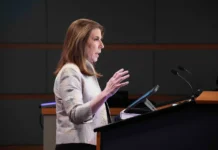Knesset member Michal Cotler-Wunsh of the Blue and White Party submitted a bill in Israel’s Knesset to require Arabic-language studies.
Proposed as an amendment to the law on public education, the bill would make it mandatory for Jewish schools in Israel to teach all students Arabic starting in elementary school and through the end of their studies.
According to Cotler-Wunsh, the Arabic taught to Israeli students would include an emphasis on both the spoken and the written language, allowing them to understand and be able to communicate with their Arab neighbors in Israel and the region, and helping to bridge the cultural and language gaps that currently exist.
“Always and especially with the potential paradigm shift taking place in the Middle East—away from rejectionism and towards normalization based on recognition that enables negotiation, and ultimately, peace—it is imperative for our children to be able to communicate and engage with Arabs in Israel and neighbors in the region,” she told JNS. “I am hopeful that this will provide the path forward to mutual recognition, enhanced conversation, coexistence and sustainable peace with additional peoples and countries in our region and beyond.”
Her grandfather left Iraq for Israel in 1929 and worked as a tailor until the day he died, which she said shaped her identity and her political understanding of the legal importance of “not recognizing Jewish refugees as what they were.”
At the event, she posed that the Abraham Accords are an opportunity to “challenge the paradigm from rejectionism to normalization,” to change the ‘Three Nos’ of the 1967 Khartoum Resolution (the fourth Arab League summit held in Khartoum following the Arab defeat by Israel in the Six-Day War) to ‘Three Yeses’—yes to recognition of Israel, yes to negotiation with Israel and yes to peace with Israel.
Arabic studies, said Cotler-Wunsh, can lead Israel’s citizens to become a “bridge for peace and education.” She emphasized that the shared Abrahamic values that bind us are an opportunity for “power of moderation from all religions … call[ing] out radical voices and expos[ing] double standards that other countries enable.”
Radicalism, she said, “ultimately encourages a culture of terror regimes.”
As an international lawyer and human-rights activist, added Cotler-Wunsh, there is “tremendous opportunity externally and internally” to “utilize the language of rights,” not only by teaching Arabic in Israeli schools, but also by “fighting for hearts and minds using legal mechanisms, technology and digital platforms.”
‘Educate the public on our history and heritage’
Others at the online event similarly mentioned language as one of ways Israelis and Mizrahi Jews can trailblaze a path forward sustainable peace in the region.
Ellie Cohanim, deputy special envoy to monitor and combat anti-Semitism at the U.S. Department of State, related seeing a “historic opportunity” in the Abraham Accords and normalization of ties with several Arab countries, likening it to “cousins being reunited after a forced exile.”
“It is something many of us imagined only possible for our children and grandchildren,” said Cohanim, adding that Mizrahi and Persian Jews “can play a particularly special role, as we have a cultural understanding, the language, food, warmth of personality—and we understand each other.”
Similarly, said Hen Mazzig, a senior fellow at Tel Aviv Institute, reflected: “We share the same culture, language, cuisine and approach to life.”
Sarah Levine, executive director of JIMENA, also referred to “Arabic outreach” as vital to spreading awareness and advocating for Jewish refugees and their descendants, and to “educate the public on our history and heritage.”
Reflecting on the 850,000 Jews that were ethnically cleansed from Arab lands and Iran—a collective exile that has caused implications personally, nationally and internationally—Cotler-Wunsh maintained that remembrance is a prospective imperative, as opposed to a retrospective imperative.
“We create and give voice to the manifestations of the challenges that this historic moment presented and its opportunities,” she said, “bringing us back to our shared ancestral homeland.”


























